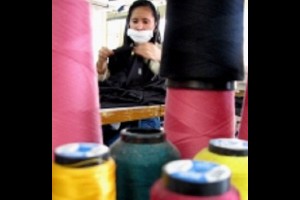DTI urges US solons to back vital trade bill

MUCH-NEEDED BOOST A Baguio City garments factory worker is shown in this photo taken in 2007. The passage of the Save Act is seen to benefit both the US textile industry and Philippine garment manufacturers. INQUIRER FILE PHOTO
The Department of Trade and Industry is trying to convince more United States lawmakers to help push the passage of the Save Our Industries Act (Save Act), to give the Philippine garments industry a much-needed boost.
In a recent dinner with US legislators hosted by the Philippines-United States Business Council, Trade Undersecretary Cristino Panlilio appealed to the visiting lawmakers for support, citing the rich historical and cultural ties between the two countries.
Panlilio said the passage of the Save Act would benefit both the United States textile industry and local garment manufacturers.
“This is a landmark piece of legislation that will redound to great benefits for both our people. It will revive the Philippines’ garment industry, which has been in the doldrums ever since the end of the quota regime. At the same time, (it will) increase exports of US textiles to the Philippines and other Asean countries to up to $500 million. This definitely is a win-win solution,” Panlilio said.
Republican Congressman Dana Rohrabacher of California said he would help push for the bill’s passage once it is reintroduced in the US Congress.
“Free trade should be encouraged among free countries. The Philippines is a democracy. We should allow further trade to prosper,” Rohrabacher said.
The Save Act is expected to provide enough incentives for garments exporters in the Philippines to expand their operations through a grant of preferential treatment from the United States.
The bill supports the country’s inclusion in the 809 Program, which gives various benefits to US trading partners that produce garments out of US-made fabric or yarn.
Garment manufacturers from Mexico, the Caribbean and Andean countries already enjoy preferential treatment, with benefits ranging from lower duties to quota-free and duty-free entry into the United States.
Under the 809 component of the bill, US-made fabric and yarns cut and wholly assembled in the Philippines would qualify to re-enter the US duty-free.
Garments made of US spun yarn or extruded yarn formed in the Philippines, on the other hand, would be allowed to re-enter the US at just half of the most favored nation (MFN) duty.
Introduced in June 2009 by Washington State Representative Jim McDermott and California Rep. Brian Bilbray, the Save Act also had a companion bill in the US Senate filed by Senators Kit Bond and Daniel Inouye.
The Philippine government is pushing for its reintroduction in the 112th Congress.
Aside from Rohrabacher, who headed the US Congressional delegation, other legislators who recently visited the country included Democrats Russ Carnahan of Missouri, Jim Costa of California and Jeff Duncan of South Carolina, as well as Republicans Louie Gohmert and Ted Poe, both from Texas.
Together with US House of Representatives senior staff and US Ambassador to the Philippines Harry Thomas, the American lawmakers came here to be briefed about security issues, particularly in Mindanao and the Spratlys, as well as money-laundering activities by international banks.